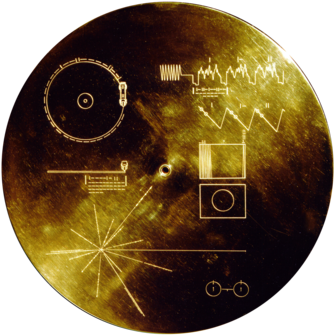« Prev Next »
When NASA launched the Voyager 1 spacecraft on 5th September 1977, some 36 years ago, few envisaged the magnitude and longetivity of the journey it would go on to take. Now having reached a distance of around 125 AU from Earth, over a billion miles away, it is by far the the furthest man-made object ever... and it's still travelling on.

Voyager will soon venture out of the solar system and into interstellar space, though scientists can't say exactly when that will be, or even know how to say definitively when it has. This will be a huge moment in the story of mankind's space exploration.
Space is just space, right? So what's so special about Voyager leaving our solar system? Simply put, everything inside our solar system is influenced by the Sun, and interstellar space is just the space between the solar systems in a galaxy. The significance is that it is venturing into the unknown - nothing man-made on Earth has ever left our solar system. Voyager 1 will be the first to do so.
Voyager recently entered a region dubbed the 'magnetic highway' in which the Sun's magnetic field enables energetic ions from inside the heliosphere to escape out of the solar system and allows cosmic rays from interstellar space in. The heliopause, believed to be the border to interstellar space, is expected to be crossed by Voyager imminently.
Voyager's ongoing journey does however come with a drawback. The spacecraft will over the next few years have its operations reduced and then will run out of power, ceasing being able to transmit data back to us here on Earth. It will then continue onwards through the Universe but in silence... though the Voyager spacecraft carry their famous Golden Records: gold-plated discs carrying a visual representation of Earth and us, in the event that the spacecraft are ever come across by extraterrestrial life.
Many years and missions later, Voyager is still one of the great success stories of mankind's space exploration.
NASA's website on the Voyager spacecraft: http://voyager.jpl.nasa.gov
Image: Voyager's Golden Records (NASA JPL)























hear the sound of interstellar space recorded by Voyager
http://www.thedailybeast.com/articles/2013/09/14/voyager-is-sending-us-the-sounds-of-interstellar-space.html
-118 photographs
-90 minutes of music
-greetings in 55 human languages and one whale language
-an audio essay featuring everything from burbling mud pots to barking dogs to a roaring Saturn 5 liftoff
-a remarkably poetic salutation from the Secretary General of the United Nations
-and a human EEG recording.
Project summarized here (NASA):
http://science.nasa.gov/science-news/science-at-nasa/2011/28apr_voyager2/
and here (MIT):
http://space.mit.edu/instrumentation/voyager
Check out this sample of images and audio here, starting in Sumerian!:
http://www.youtube.com/watch?v=QTDK2jCVPN0&feature=related&nomobile=1